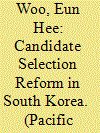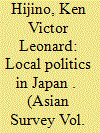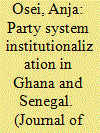| Srl | Item |
| 1 |
ID:
175592


|
|
|
|
|
| Summary/Abstract |
This paper analyzes how democratization has affected the dynamics of candidate selection in South Korea. After democratization in the late 1980s, it was expected that intra-party democracy would follow. In response to increasing public demand, the major parties adopted primary systems in the early 2000s. Nonetheless, most candidates for the legislature are still nominated by a small number of central party elites without additional ballots in the local branches. To explain the persistence of the exclusive, centralized features of candidate selection, I highlight the limited impact democratization has had on the political environment in which parties operate. More specifically, since democratization ended in a compromise among a small number of party leaders, South Korea retained much of the political legacy from authoritarian times, such an electoral system advantageous to the major parties and legal provisions restricting electoral campaigns, party activities, and political participation. The continuation of these political institutions makes radical candidate selection reform highly unlikely as the party elites have no incentive to expand and decentralize the selection process. Without significant changes to the political institutions at the national level, the dominance of the central party elite over the final outcome of candidate selection looks likely to continue for the foreseeable future.
|
|
|
|
|
|
|
|
|
|
|
|
|
|
|
|
| 2 |
ID:
107440


|
|
|
|
|
| Publication |
2011.
|
| Summary/Abstract |
The existing literature on party organization is deeply divided over the question of how much freedom of choice decision-makers in a party enjoy in relation to their environment. Although the resulting theoretical deadlock seriously weakens our understanding of party formation and change, no attempt has been made to reconcile the different approaches. This article aims to do just that by offering a historical institutionalist perspective on party organization. Studying the development of political parties in South Korea, it argues that party organizations are best understood as strategic responses to electoral markets. Party organizations reproduce and change, as advantaged factions defend the status quo, while disadvantaged factions work towards organizational reform.
|
|
|
|
|
|
|
|
|
|
|
|
|
|
|
|
| 3 |
ID:
147654


|
|
|
|
|
| Summary/Abstract |
In recent years, the Japanese conservatives’ dominance in local politics appears to be less of an asset, as traditional analyses claim, and more of a liability. This article argues that the LDP’s entrenched local party organizations have become a restraint on party leadership in pursing key national policy initiatives.
|
|
|
|
|
|
|
|
|
|
|
|
|
|
|
|
| 4 |
ID:
127760


|
|
|
|
|
| Publication |
2013.
|
| Summary/Abstract |
This paper presents a comparative case study of party system institutionalization in Ghana and Senegal. Both countries experienced a democratic change in government in the year 2000, but while positive development has continued in Ghana, democratic quality in Senegal decreased over time. Can the concept of party institutionalization help to explain this diverging development? Four dimensions of party system institutionalization are systematically compared: regularity, social roots, legitimacy, and party organization. It is found that party competition in Ghana is characterized by high stability and a low number of parties. The major parties are organized throughout the country and have definable support bases with deep historical roots. They give orientation to voters and are perceived as legitimate actors. In Senegal, in contrast, the party system is fluid and less predictable. Parties are not structured along social cleavages and many of them are weakly organized and highly personalistic. In summary, the case studies support the assumption that an institutionalized, well-structured party system in which relevant social cleavages are translated into electoral alternatives is positively related to democratic quality.
|
|
|
|
|
|
|
|
|
|
|
|
|
|
|
|